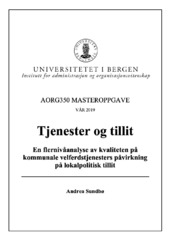| dc.contributor.author | Sundbø, Andrea | |
| dc.date.accessioned | 2019-08-01T12:19:21Z | |
| dc.date.available | 2019-08-01T12:19:21Z | |
| dc.date.issued | 2019-07-06 | |
| dc.date.submitted | 2019-07-05T22:00:02Z | |
| dc.identifier.uri | https://hdl.handle.net/1956/20643 | |
| dc.description.abstract | Norwegian citizens exhibit high levels of trust towards government, politicians, and public institutions in general, compared to citizens of most other countries. In this thesis I propose that high quality welfare services are an important factor in this political trust, by turning the focus to service delivery on the municipality level. The main research problem reads as follows: «To what extent does the quality of municipal welfare services affect citizens’ trust in local government?». Norwegian municipalities are in charge of delivering important welfare services to the population. In the literature on political trust there are two main theoretical traditions on the origin of the phenomenon. Institutional theories emphasize endogenous traits of the institutions, especially performance, as being vital for the people’s trust towards government. Cultural theories on the other hand, emphasize exogenous influences that are socially internalized outside of the political sphere as being the main creators of political trust. This thesis tests the «micro-performance hypothesis» in institutional trust theory. This hypothesis advocates a causal link from the quality of government services, via service satisfaction, to political trust. The hypothesis is tested in the three different municipal welfare services: kindergarten, primary school and geriatric care. I have used several quality indicators to operationalize the concept of service quality in the different service areas. To answer the research questions, I have conducted a multilevel analysis with individual level data from Innbyggerundersøkelsen 2015 and municipal level data from the KOSTRA dataset of Statistics Norway (SSB). The analysis finds that some specific quality indicators affect trust in local government more than others. In some cases, citizens’ experience with the services acts as an influential interaction term. Service satisfaction is found to be an important factor for political trust, but the analysis does not provide clear evidence that satisfaction is a consequence of service quality. The analysis overall shows a modest, but present effect of service quality on political trust. This implies that the municipals’ and politicians’ efforts in improving and prioritizing municipal welfare services, can to some extent pay off in the form of increased trust amongst their citizens. However, this effect can turn out to be minor. | en_US |
| dc.description.abstract | Norske innbyggere utviser høy tillit til politisk-administrative institusjoner og aktører, sammenliknet med resten av verden. I denne masteroppgaven undersøker jeg kvaliteten på offentlige tjenester som en mulig sentral faktor for denne tilliten, ved å se på de kommunale velferdstjenesteområdene barnehage, grunnskole og eldreomsorg. Fokuset rettes mot kommunen som tjenesteleverandør fordi norske kommuner spiller en betydningsfull rolle i nordmenns hverdag, og er en viktig kontekst for innbyggernes holdninger til det offentlige. I litteraturen om opphavet til politisk tillit kan vi overordnet skille mellom to teoretiske tradisjoner: institusjonelle og kulturelle teorier. Institusjonelle teorier anser politisk tillit som endogent skapt av de politiske institusjonene, som en følge av egenskaper ved dem og resultatene de leverer. Kulturelle teorier hevder at politisk tillit heller er eksogent skapt av forhold utenfor institusjonene, og av de kulturelle sosialiseringsprosessene i samfunnet som innbyggeren blir påvirket av. Oppgaven tester overordnet «micro-performance»-hypotesen i institusjonell tillitsteori, som forfekter en kausal sammenheng mellom offentlig tjenestekvalitet og politisk tillit, med tilfredshet som en bindende komponent. Problemstillingen «I hvor stor grad påvirker kvaliteten på kommunale velferdstjenester innbyggernes lokalpolitiske tillit?» belyses ved hjelp av flernivåanalyse med individdata fra Innbyggerundersøkelsen 2015 og kommunedata fra SSBs KOSTRA-datasett. Tjenestekvalitet operasjonaliseres gjennom flere ulike kvalitetsindikatorer på hvert tjenesteområde, og tjenesteerfaring inkluderes som samspillsledd. Analysene finner at noen kvalitetsindikatorer påvirker innbyggernes lokalpolitiske tillit, og at tjenesteerfaring i noen tilfeller spiller en utslagsgivende rolle som samspillsledd. Tilfredshet med de kommunale tjenestene viser seg å være en viktig faktor for lokalpolitisk tillit, men analysene finner ingen klare bevis på at tjenestetilfredshet er en konsekvens av tjenestekvalitet. Analysene viser dermed en begrenset, men tilstedeværende effekt av tjenestekvalitet på lokalpolitisk tillit. Dette tyder på at kommunenes og politikernes innsats på de kommunale tjenesteområdene til viss grad kan gi seg betalt i form av økt tillit i befolkningen, men at effekten kan være mindre enn forventet. | en_US |
| dc.language.iso | nob | |
| dc.publisher | The University of Bergen | |
| dc.subject | tjenestekvalitet | |
| dc.subject | lokalpolitisk tillit | |
| dc.subject | flernivåanalyse | |
| dc.subject | kommunens omdømme | |
| dc.subject | tjenestetilfredshet | |
| dc.subject | politisk tillit | |
| dc.title | Tjenester og tillit. En flernivåanalyse av kvaliteten på kommunale velferdstjenesters påvirkning på lokalpolitisk tillit | |
| dc.title.alternative | Services and Trust. A Multilevel Analysis of the Quality in Municipal Welfare Services' Effect on Trust in Local Government | |
| dc.type | Master thesis | en_US |
| dc.date.updated | 2019-07-05T22:00:02Z | |
| dc.rights.holder | Copyright the Author. All rights reserved | en_US |
| dc.description.degree | Masteroppgave i administrasjon og organisasjonsvitenskap | |
| dc.description.localcode | AORG350 | |
| dc.description.localcode | MASV-AORG | |
| dc.subject.nus | 731111 | |
| fs.subjectcode | AORG350 | |
| fs.unitcode | 15-12-0 | |
